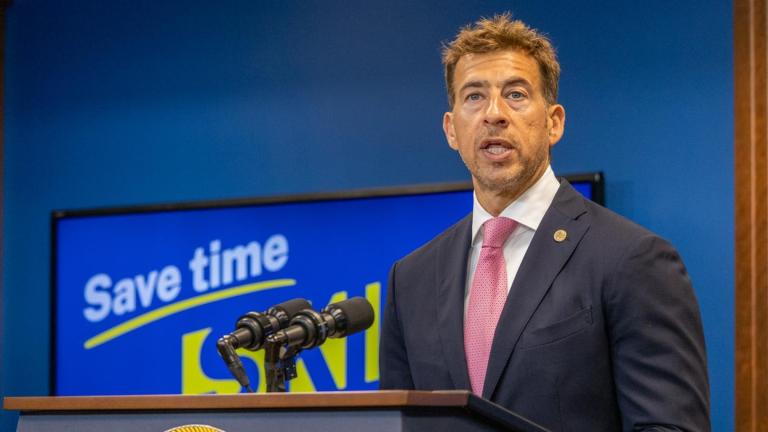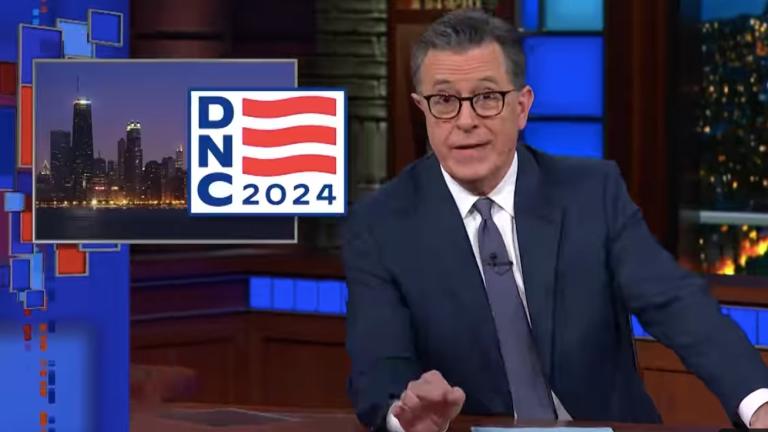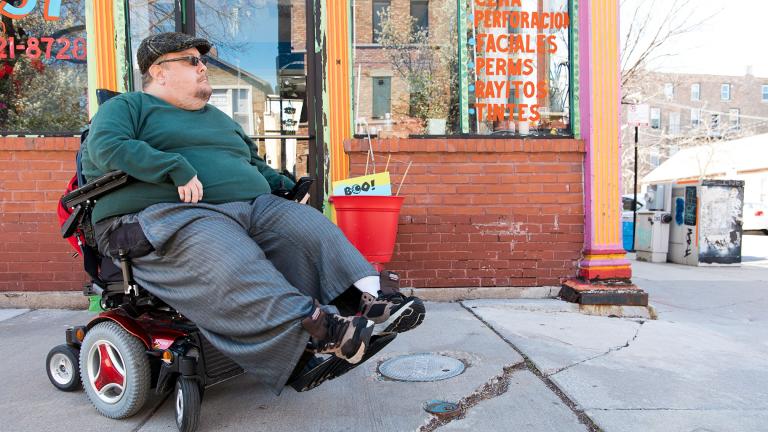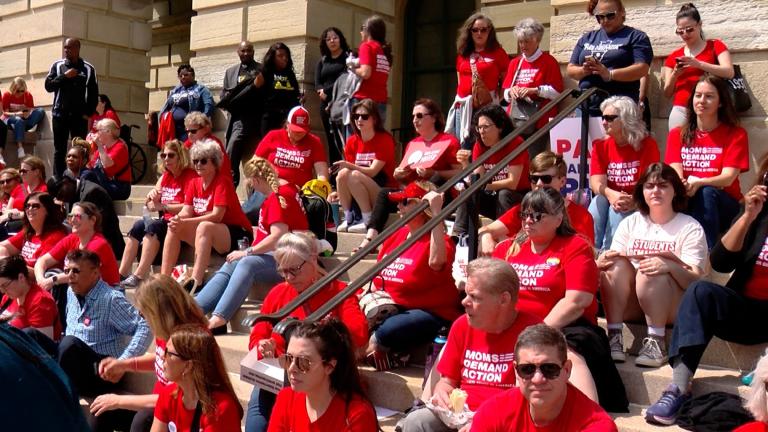On Chicago Tonight at 7:00 pm, the jury forewoman from the Blagojevich retrial, along with two other jurors, joins Elizabeth Brackett to discuss the deliberation process and how they arrived at their verdict. We also spoke with two additional jurors from the trial. We asked Maya Moody and Rosemary Bennett a series of questions by phone on Tuesday, one day after they handed down their verdict in the corruption retrial, finding former Illinois governor Rod Blagojevich guilty on 17 of 20 counts. Read what they had to say in the Q&A below. 
Maya Moody: Juror 103
Age 41, Photographer, Chicago How would you describe your fellow jurors and the relationship you developed with them? “We got along really well, surprisingly well. Normally when you think about having 11 women together, you think there’s bound to be some problems. It happens every day in the workplace. Sometimes women don’t work well together. We all worked together really well.” Can you describe the deliberation process and how you arrived at the verdict? “It was mainly taking the evidence that was presented to us and applying the law that we were given. Doing that, you couldn’t help but come to the conclusion that we came to. It was very specific. A lot of counts were attempted counts. It wasn’t that he had to receive something in his hand at the end of the day. It was his attempt to receive something.” Did Blagojevich taking the stand help or hurt him? “I think it did a little of both. For the ones that we found him not guilty and we were deadlocked, I think it helped because there were no tape recordings for that. Based on his testimony, especially for counts 16 and 17, we could see how passionate he was about getting a capital bill passed as opposed to doing anything else. The state did not prove beyond a reasonable doubt that he was guilty on those counts because we did take his testimony into consideration. In some of them, it might have had the opposite effect. Maybe for the hospital bill. We could tell that he was vey passionate about health care. When it came to health care, he was the health care governor. So if you were that passionate, why let the pediatric increase sit on your desk? Why not push it through if you’re really passionate about getting things done for health care?" Did you have any doubts when finding Blagojevich guilty? “We’re human, he’s human. You have feelings. You don’t want to have that drastic of an effect on someone’s life. You’re really pulling for him but the evidence is pointing a different way.” What do you think an appropriate sentence would be for the former governor? “Its tough. I don’t think he should get 20, 25, or 30 years because they were all attempted charges. He never got anything for it. So I’ve been hearing somewhere around 10. If it’s 10 years, he might serve less time. If it’s a case where he is sentenced 10 years and only serves 7 or 8, I think that may be a little harsh, but that’s in the ballpark. I think 5 years is good. If it’s a long sentence, I think that’s not reasonable.” Do you feel like you got enough instructions on how to be a juror and the jury process? “Yes and no. I wished I had known to take better notes. At the end of the day, I thought we would get transcripts from testimony to read back through but that’s not the case. I wish I was better at my note-taking. But other jurors took really great notes so I guess it balanced out. I guess that’s why they put 12 jurors together! They take you and throw you in the room with all this evidence, and a bunch of books and binders and legal documents. It’s scary at first. We spent time going through and deciphering the instruction book, reading and re-reading and making sure we understood what was there.” Would you ever want to serve on a jury again? “I would hope that serving on this trial would excuse me from any other jury that I would be summoned for!” What is your assessment of the jury system? Does it work well? “I haven’t really thought about. I think it works well. Going into it, you are a little skeptical for sure, but as we got into deliberation and once we applied the evidence to the law, we didn’t have a choice but to come back with the outcome that we came back with.” Did Patti Blagojevich’s appearance in court impact the jury? “Blagojevich was very emotional when he talked about his wife. This is going to affect his entire family. Everybody really felt for him and for her, but we had to separate that. We couldn’t let that sway what we had to basically do. I felt for others who have been dragged down into everything with the former governor. I knew that I have to put all of that aside and basically focus on what’s before us. Law has to be applied to it.” 
Rosemary Bennett: Juror 124
Age 73, Retired food service worker, Aurora How would you describe your fellow jurors and the relationship you developed with them? “They were a wonderful group of people, and we got along really well and respected one another’s opinions, even if we didn’t agree with them. And it was just a very, very nice experience.” Can you describe the deliberation process and how you arrived at the verdict? “First, we went in, we read our jury instructions and then we listened to all the tapes in chronological order, and then we went back again, and read, as needed, we read the jury instructions again. And then when we were ready to deliberate, we started and did one main scheme at a time. All of the other counts were incorporated in Count 1. It was the great, big one so we left that one sitting there and went on to the others, and then we went back and checked on Count 1.” Did Blagojevich taking the stand help or hurt him? “I don’t think for us it made a whole lot of difference but I would probably say, if I had to choose one, that he probably hurt himself by taking the stand. Sometimes he tripped himself up. He’d say something, then the next day he would say something totally different about the same thing. So you say, which one do I believe? And he would contradict the wiretaps. So do you believe that Rod or this Rod?” Did you have any doubts when finding Blagojevich guilty? “No. I think we went over them, as the expression goes, with a fine-toothed comb. And I think we did the very best job possible with all of the counts. And I think we were all very satisfied when we got through it that we had done the best that we could do.” What do you think an appropriate sentence would be for the former governor? “I think that it needs to be long enough for him to realize that, as he said himself right off the bat, that nobody was beyond the law. Those were not his exact words but he said that, and I think that was our hope as a jury; that we would be able to impress that upon him: that he wasn’t beyond the law, nor was any other politician. It should send a message to him and other politicians that there is that sentence for what you do wrong eventually.” Do you feel like you got enough instructions on how to be a juror and the jury process? “Yes. I think at first we felt overwhelmed when we realized what a grave responsibility had been handed to us. You listen to different witnesses, you hear the counts and the wiretaps, and the judge explains things, and then you go back in that room and you realize that these 12 people basically have a man’s life in their hands. And it’s an awesome responsibility and a very grave responsibility, and I think that’s when it really hit me.” Would you ever want to serve on a jury again? “I would, I think. I’m 73, so I don’t know that I would want to serve, if it was five or six years down the road, I don’t know that I would be able to handle the strain of traveling to the city every day. But I would be very glad to serve on another jury.” What is your assessment of the jury system? Does it work well? “I do. I think that all of us felt very satisfied when we got through it because we felt that we did the very best job that we could do. I think all of us have faith in the jury system, even if some of them didn’t before. It’s very interesting to see how the court operates.” Did Patti Blagojevich’s appearance in court impact the jury? “As far as getting the case, it didn’t. But I was very impressed with the number of people around her who loved her and who surrounded her in court at that time. Just the fact that her aunt and her sister, and brother and close friends were there to support her. She’s going to have to count on those people now and so are the girls, and they have a good number of people who do care about them and I know they will help see them through this trial. I think that these trials are meant to better us. Whether we like them or not, all of us end up stronger when we go through trials because we all come out on the other side.”








